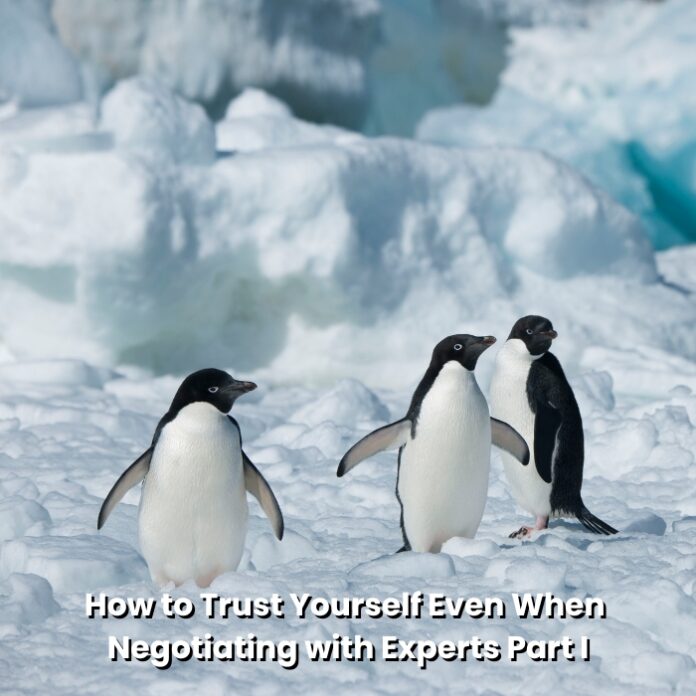My hip blew out 3 weeks before I was booked for my big adventure to Antarctica. It was the trip of a lifetime, so I wasn’t about to miss it. But I could barely stand upright. I certainly couldn’t walk a straight line as I cantilevered side to side with each step. I hoped it was true that Weebles wobble but they don’t fall down.
I needed to get this fixed … fast. I needed to get in and out of zodiacs, traipse among the penguins (while not wobbling like one), hike volcano floors, not to mention navigate the heaving ship crossing the infamous Drake Passage. Through this process, I learned some valuable lessons and was served up some powerful reminders about the importance of negotiating for ourselves in all areas of life … even if it means going up against experts. I thought I’d share them with you.
When faced with experts, whether personally or professionally, we often defer to their opinions. We’re less likely to even question positions put forward by proclaimed experts let alone challenge them. This practice does us a disservice. It’s important to explore and raise our awareness about how we interact with experts if we want to negotiate our best lives. My recent hip fiasco was a great reminder for me, and I hope a cautionary tale for you (or at least a thought-provoking exercise that gets you re-examining how you interact with experts).
When my hip kicked out, I started kicking myself as I was reminded about my subpar negotiation when the issue first arose. Because this hadn’t come out of nowhere. In fact, I’m embarrassed to admit that I first noticed twinges of a hip problem five years ago. To my credit, I did go to the doctor and voice my concerns. He did a bunch of flexibility & mobility tests and told me my hip was fine. I reminded him that I was hyper-flexible so perhaps mobility wasn’t the best indicator. I was confident something was wrong. He assured me I was wrong.
I went back the next year with the same complaint as the problem had escalated. I got the same reaction from my doctor and sidled away again with my tail between my legs. And it wasn’t until the next year, when the breathtaking hip kicks were happening more frequently that I insisted I be sent for an MRI. Note that my doctor was still telling me there was no way anything was wrong with my hip given my mobility and flexibility.
Let’s pause here for a moment. As an attorney I negotiate for a living. As the founder of Women On Purpose, creator of HERsuasion™, and author of the Wall Street Journal best-selling book, The Art of Feminine Negotiation™, I like to pride myself on my negotiation prowess. On top of that, I know my body. I knew something was off. My hip would kick out periodically, stopping me dead in my tracks and leaving me momentarily breathless. And yet I didn’t push back in the face of my doctor’s denial. Or not enough.
I should have known better. Heck, the ’A’ in my A.R.E. F.I.T. model is for ‘assertiveness’. And while I brought rapport-building and empathy to the table in my doctor’s visits, I apparently left my assertiveness out in the waiting room. This happens often when we deal with experts in a particular field. We yield our power.
We do this in our health care, in our businesses, in politics and our personal lives. Even when our intuition tells us we’re right. We doubt ourselves. We stifle the ‘I’ and the ‘T’ from our A.R.E. F.I.T. model – intuition and trust. While it’s important to learn to build trust in negotiations, it’s equally (if not more) important to trust yourself. Trust your intuition. Tap into your inner knowing.
Don’t be afraid to ask questions. Get curious. We rob ourselves of our effectiveness as negotiators when we don’t question. This is true whether dealing with our healthcare or business or beyond.
While I’m hesitant to raise the issue given its ongoing polarizing impact, COVID was a great example of this. Medical experts were touted in the media daily and these positions were uniformly accepted as irrefutable. Obvious questions were not being asked and much power was ceded. Yet, there were thousands of experts, with wildly divergent opinions and viewpoints on various aspects of this layered and complicated issue whose voices were not heard or meaningfully considered. As a result, many critical factors and long-term cross-over and ripple consequences were not discussed or considered as fully as one would have hoped.
This phenomenon is interesting and puzzling to me as history is replete with examples where hailed experts were later proven to be wrong. Experts believed the earth was flat and those who challenged the idea were ridiculed. Experts decried the idea that the earth rotated around the sun. Medical experts believed that leeches and bloodletting were legitimate cures for many ails. They also extolled that menopausal woman were suffering from hysteria and countless women were institutionalized as a result.
Had people not been willing to trust their own inner knowing, or at least pose questions to test and challenge and satisfy themselves, none of these profoundly mistaken belief systems would have changed. I raise this by way of encouraging you to face any hesitation you may feel in dealing with experts in your negotiations. Respect them, but recognize they are not infallible. Also, do your homework and come prepared to question, to challenge where appropriate, to learn, to grow, to seek best outcomes. Frankly, an expert who is not open to such dialogue ought to raise red flags.
Hopefully I’ve piqued your interest in exploring how you interface with experts in your negotiations. Stay tuned next week as we continue on this journey and I share more lessons learned on how to trust yourself in your negotiations, even and especially when negotiating with experts.





